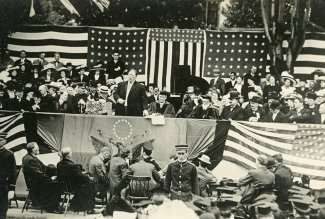
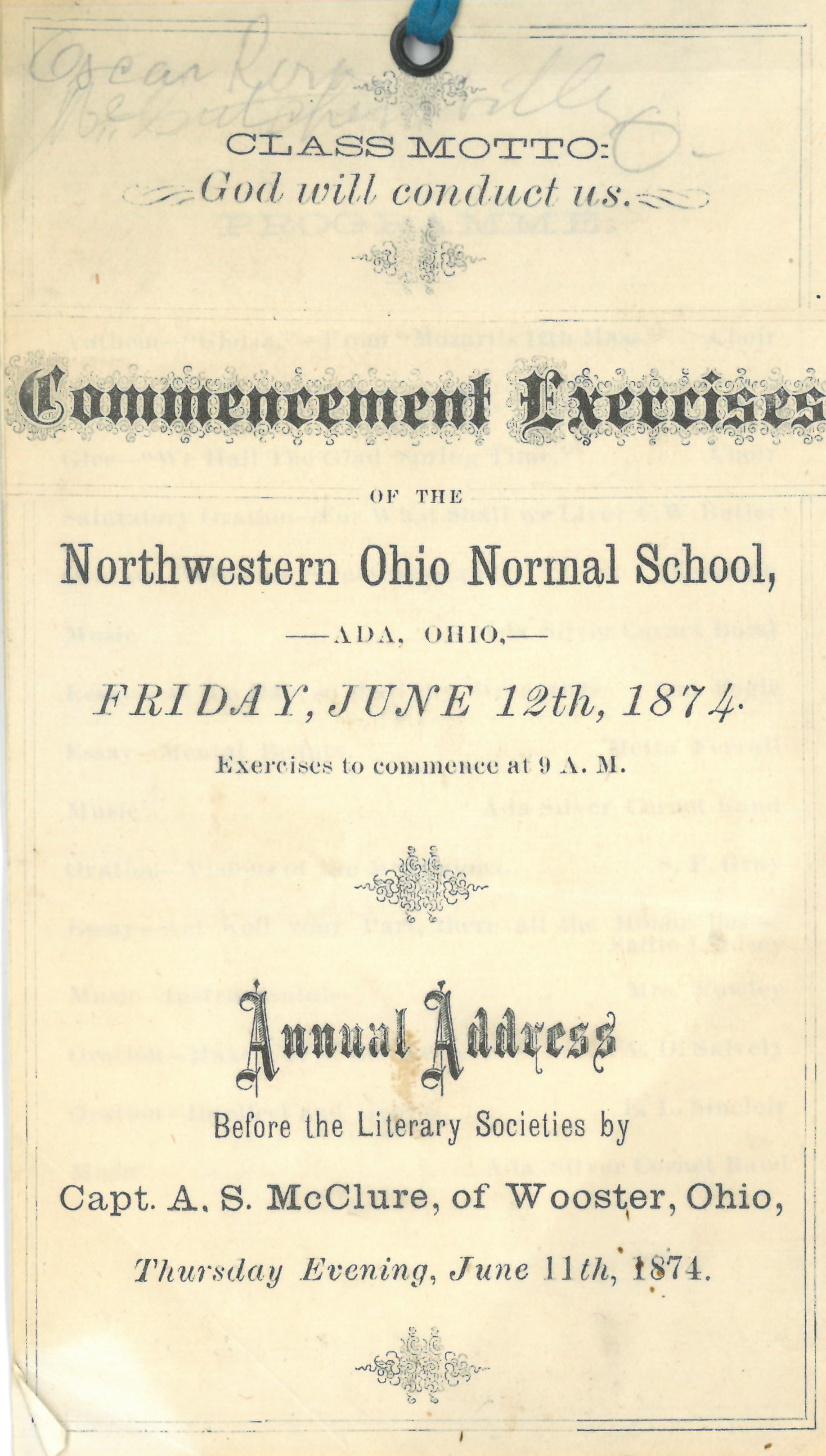
Program cover for ONU’s
first commencement in 1874.
When Ohio Northern University presented diplomas to the Class of 2024 in May, it marked a century and a half of campus ceremonies honoring academic achievement.
ONU celebrated its inaugural commencement on June 12, 1874, when people traveled by horse and buggy and technologies like the Internet and cell phones were unimaginable.
While much has changed over the course of 150 years, human sentiment transcends generations. Through the years, ONU graduates have felt a sense of accomplishment, pride, and nostalgia, as one chapter ends and another begins.
ONU’s graduation ceremonies, however, have evolved and adapted to the times, whether prosperity, depressions, wars, or pandemics.
A few commencements stand out for being more memorable than others; the most historic taking place in 1910 when the President of the United States, William Howard Taft, gave the commencement address.
Enjoy these historical tidbits about ONU commencements, circa 1874 to the present, gleaned from historical accounts and commencement programs preserved in the ONU Archives.
Who’s on board for days of listening to grandiose speeches?
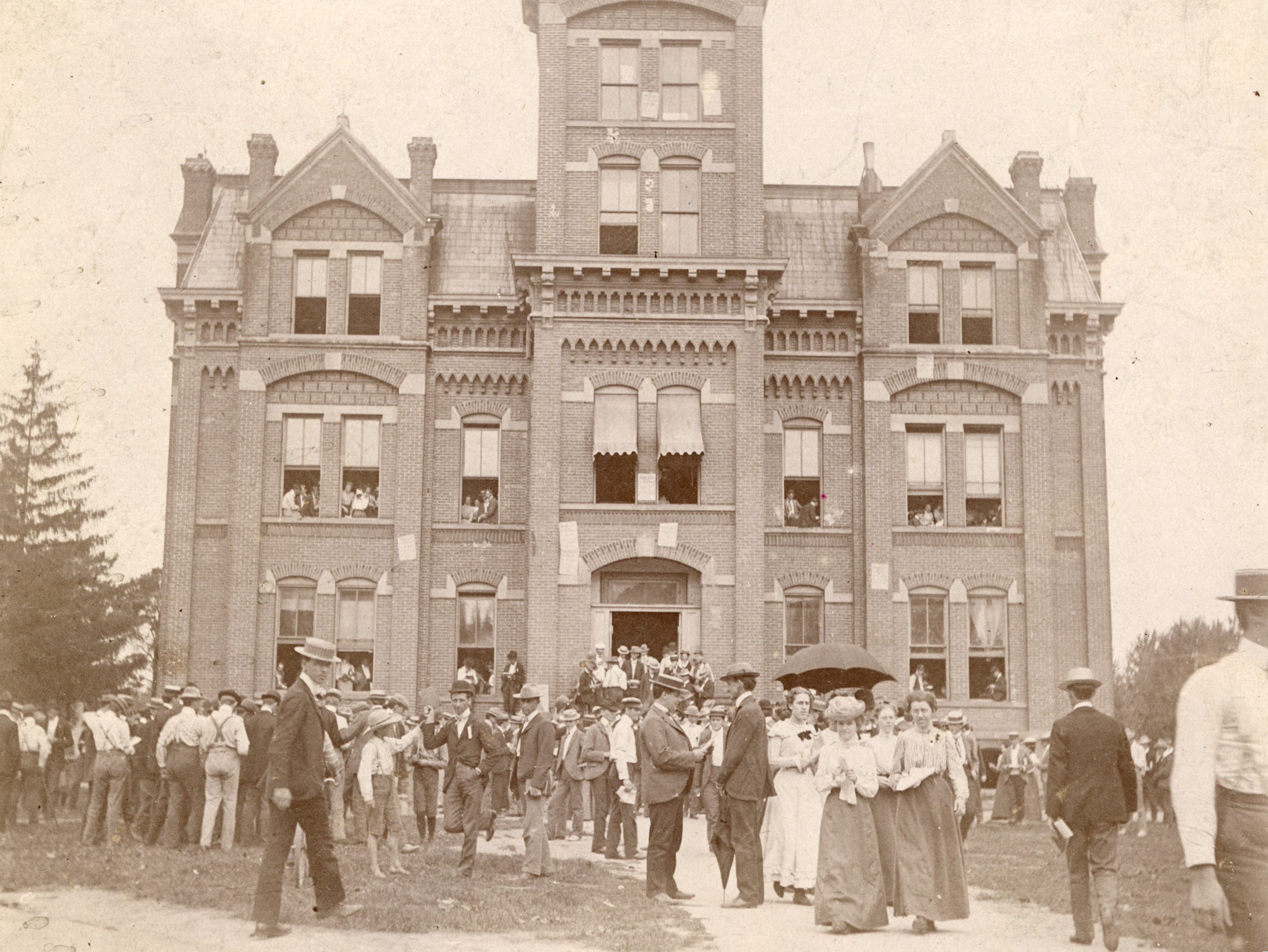
ONU commencement circa 1901
ONU’s first commencement ceremony in 1874 had just 11 graduates—6 men and 5 women. Each graduate delivered an oration/essay and ONU’s founder, H.S. Lehr, handed out the diplomas.
“It was a class of which any school could be proud,” wrote Lehr at the time.
In the late 1800s and early 1900s, ONU commencement celebrations spanned several days, and included recitations of essays and poetry, concerts, games, luncheons, and more. Every graduate gave a speech until 1891 when the classes grew too large for even “six-minute speeches over two days.”
It’s difficult to imagine people today having the patience or attention span to sit through long days of flowery speeches and activities. Undoubtedly, “a very different societal mindset” existed in those days, says Matt Francis, ONU archivist.
“People valued space and time much differently than we do today,” he explained. With limited entertainment options, they spent their leisure time in community.
An accomplishment as big and important as receiving a college diploma would—in their eyes—have warranted multiple days of speeches and celebratory gatherings, he added.
The early years weren’t without controversy, however. The literary societies from the Class of 1894 bickered so bitterly over who should be class president, that President Lehr described it as “three-ring circus” in his memoirs. The dispute was never satisfactorily resolved, prompting Lehr to allow the two literary societies to hold separate “class day exercises.”
Welcome to Ada, Ohio, Mr. President.
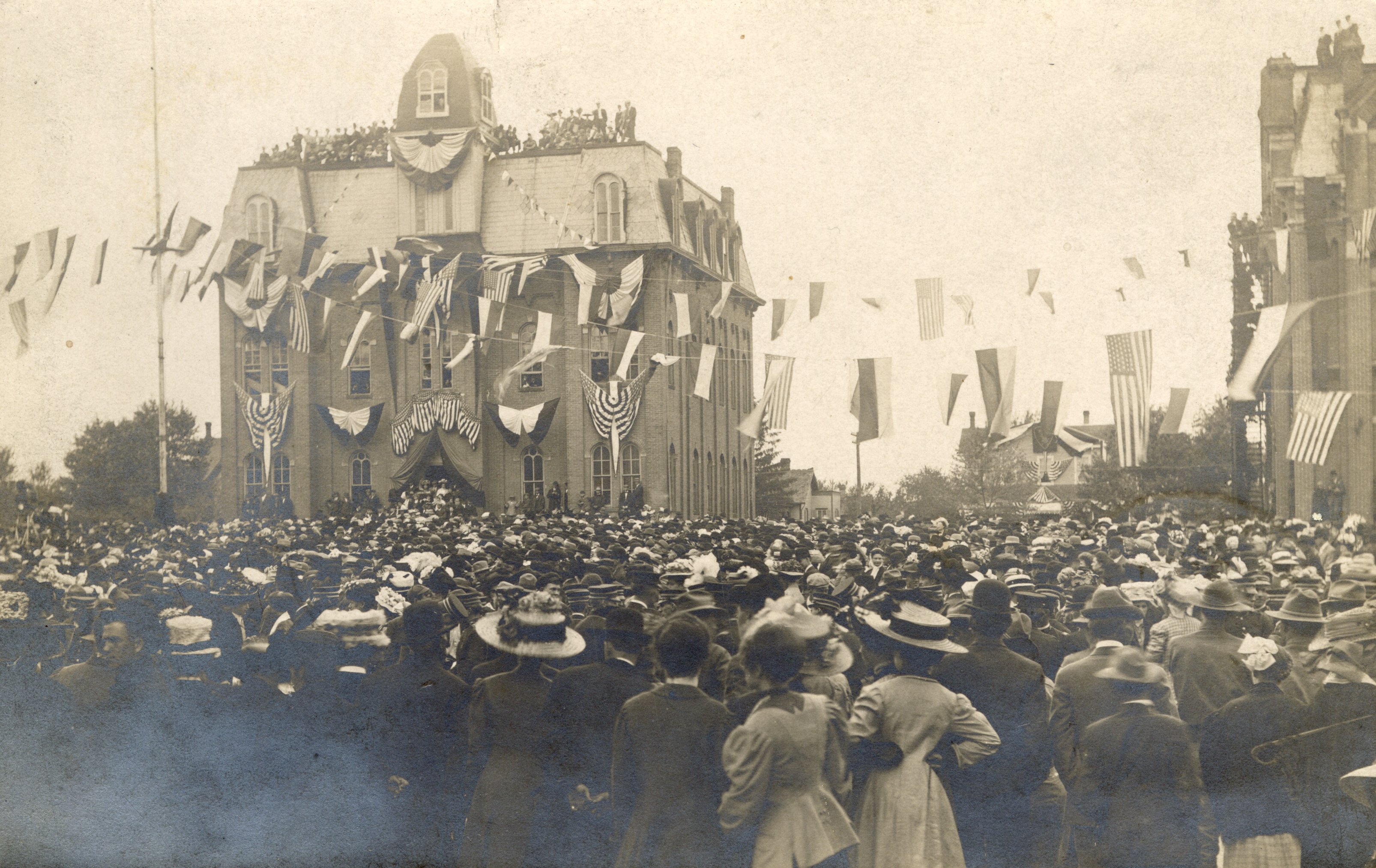
Red, white, and blue banners welcomed
President Taft to campus.
Class of 1910 graduates enjoyed the tremendous honor of having the President of United States hand out diplomas and offer words of wisdom at their commencement, June 3, 1910.
Ohioan William Howard Taft was the 27th U.S. President, serving in office from 1909 to 1913. Getting him to agree to deliver ONU’s commencement address was quite a coup, said Francis. Records show that ONU administrators had tried unsuccessfully to lure President William McKinley and President Theodore Roosevelt to Ada.
The book, The Centennial Year History: Tempered by Crises, described the occasion: “The village and the college were understandably excited, and for weeks before Taft’s arrival … town and gown had been busy refurbishing and decorating. Fifteen thousand were on hand for the president’s address, and a great throng was on hand at the Ada station when Taft’s private train pulled in at 10:30 a.m. Friday morning.”
The ONU Band, the ONU Battalion, followed by companies of the Ohio National Guard, followed the presidential entourage through gathered crowds. A special grand stand was erected for the President, the entire campus was decked out in red, white, and blue banners, and the crowd gave a roar of applause and waved white handkerchiefs as he took the stage.
Taft’s address was a “model of rather restrained inspirational rhetoric.” He expressed surprise at the number of female scholars in the audience, and asked them to “excuse me while I lecture to their brother members.” He then talked at length about the state of current professions: medicine, law, journalism (he complained about journalists), and farming.
After handing out diplomas to the 250 graduates of ONU’s 40th graduating class, Taft enjoyed a luncheon before heading back to his train.
“All-in-all the day at been a grand one for Ohio Northern …” according to Tempered by Crises.
War changes everything, including commencement.
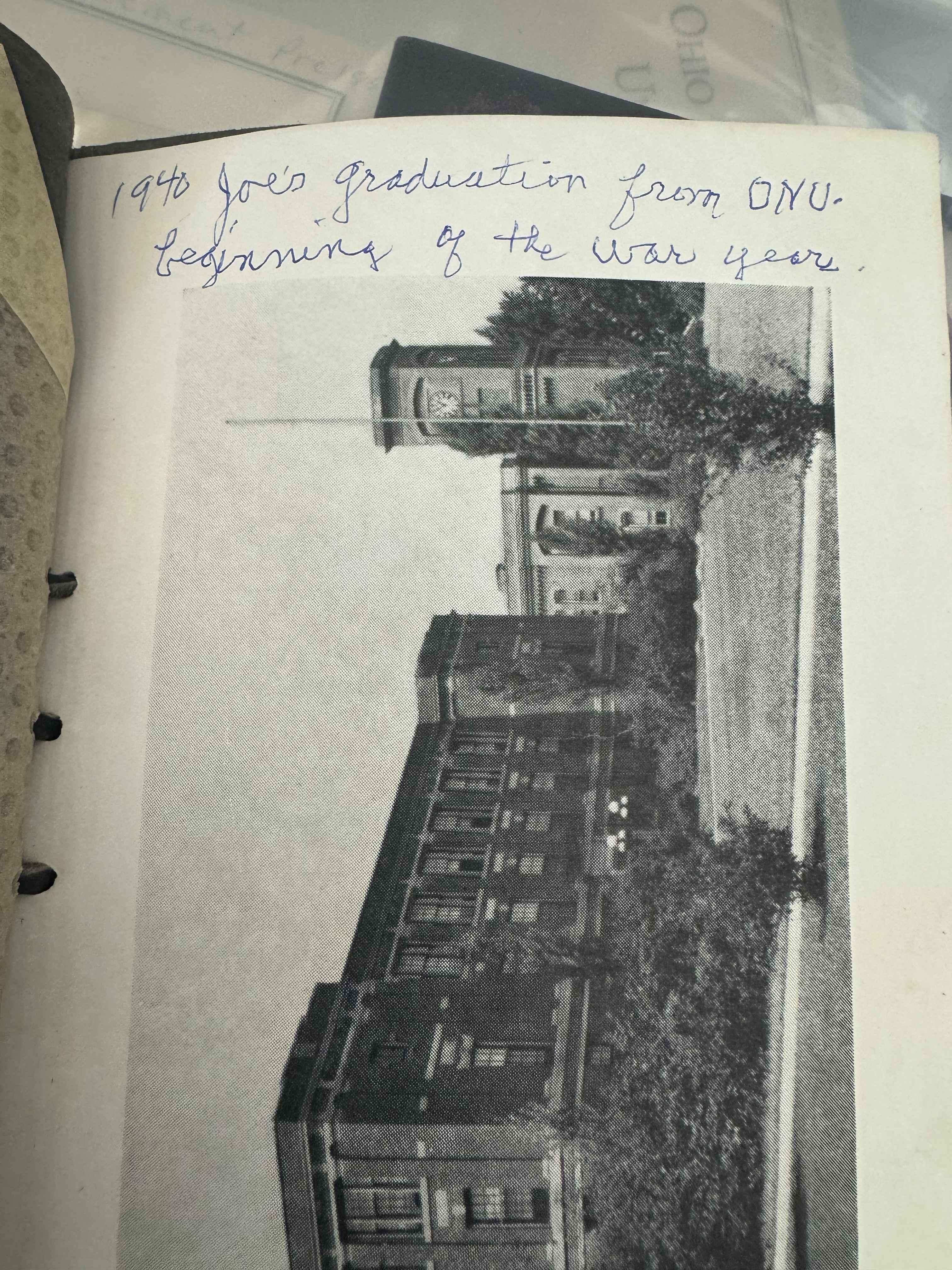
Handwritten message inside a 1940
commencement program makes
note of the war.
World War II upended life in the U.S. and on ONU’s campus.
During the early years of the war, ONU offered an accelerated program so that key professionals—especially engineers—could enter the workforce and armed forces quickly to support war effort. To this end, ONU held several commencement ceremonies throughout the year to award graduates their degrees.
The war eventually took a severe toll on enrollment.
“If 1943 had been a bad year, then 1944 was a horror,” noted Tempered by Crises. “There were fewer students than Lehr had when he opened the school 73 years before. There was one lone student in the College of Law and only 15 aspiring engineers.”
Faculty and administrators accepted drastic pay cuts to keep ONU going. After the war, thankfully, enrollment surged with the GI bill and a recovered economy.
Covid-19 cancels commencement.
More recent commencements will also go down in the history books—especially the one that didn’t happen in spring 2020 due to the Covid-19 pandemic.
In March 2020, many workplaces, businesses, and educational institutions across the U.S. shut down to control the spread of the coronavirus. Many people were becoming gravely ill with the virus and hospitals lacked the capacity and the tools to treat a mass outbreak.
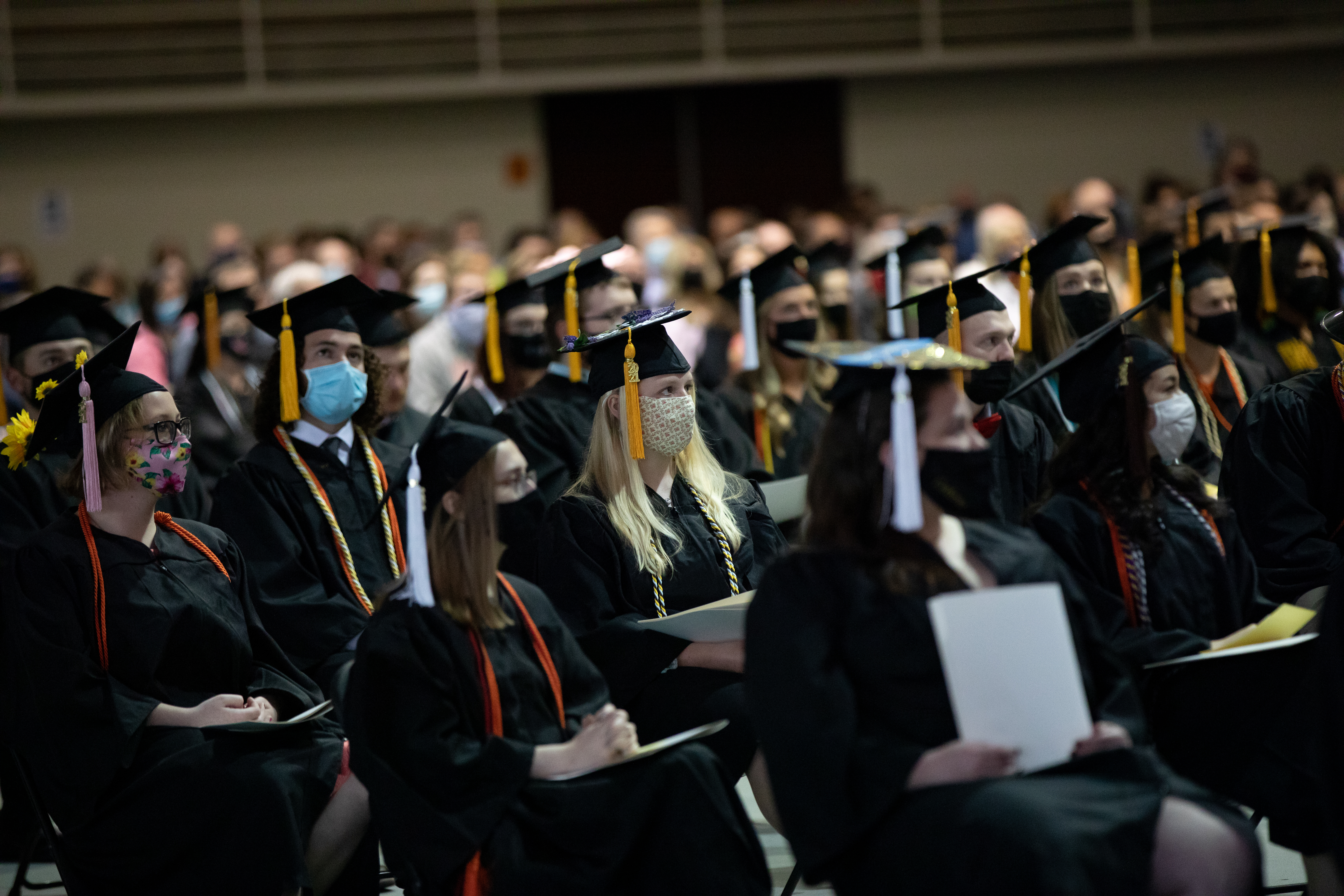
ONU cancelled commencement in May 2020
due to the pandemic, but celebrated 2020 and
2021 graduates in May 2021
ONU sent all students home in March to finish out the spring semester remotely. The University then cancelled commencement exercises in May to comply with an Ohio public health order issued in April 2020 that limited public gatherings to 10 people.
By spring 2021, better measures existed to protect people from the virus, and ONU held commencement ceremonies with modifications. Audience members sat with family in four-person pods and were required to wear masks and remain socially distant. ONU also invited 2020 graduates to come back to campus for a special commencement ceremony on May 23, 2021, to celebrate their 2020 graduation.
ONU President Dan DiBiasio said at this special commencement that the pandemic “caused changes that have ranged from the inconvenient to the inconsolable” but that ONU students had shown “grit and resilience.”
“We can mark his day as the capstone event of a year like no other,” he added.
Special thank you to Matt Francis, ONU archivist, for assisting with the research and for providing historical images of ONU commencements through the decades.